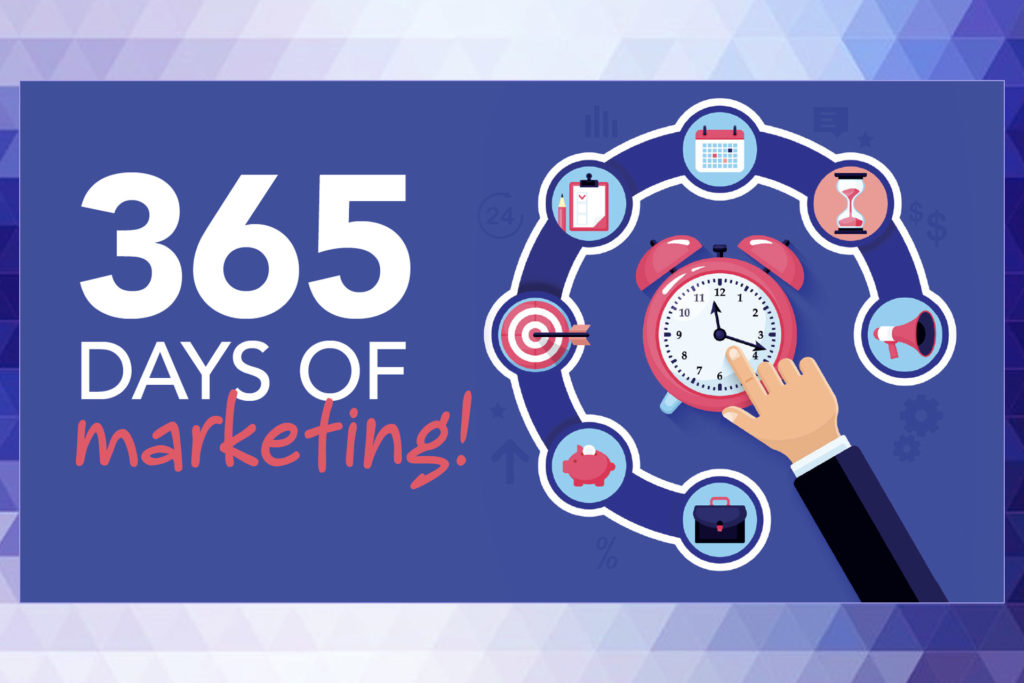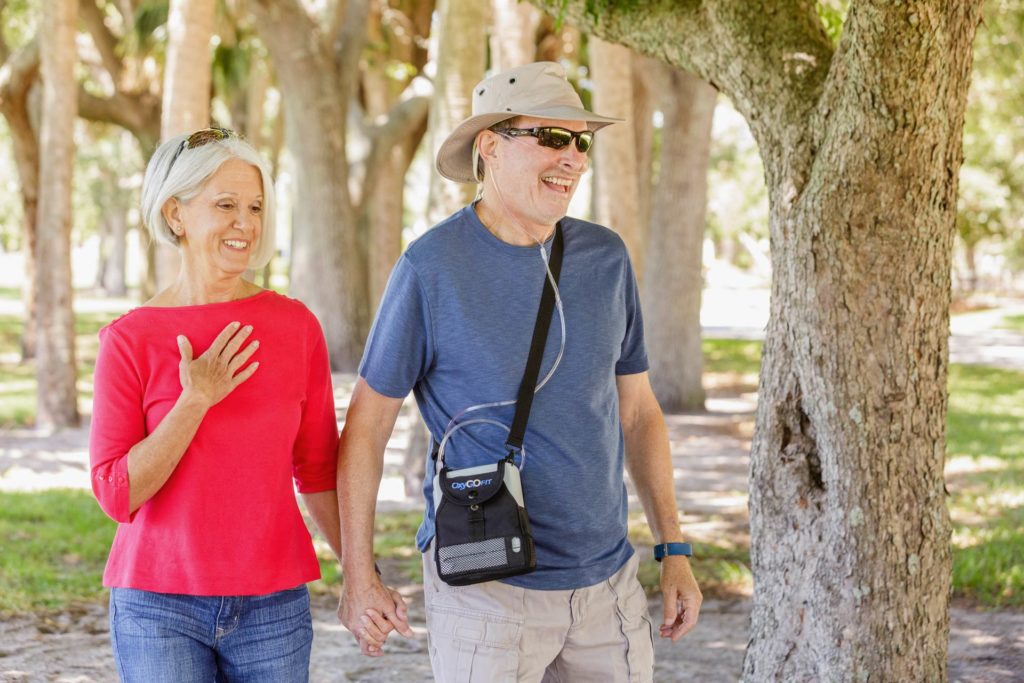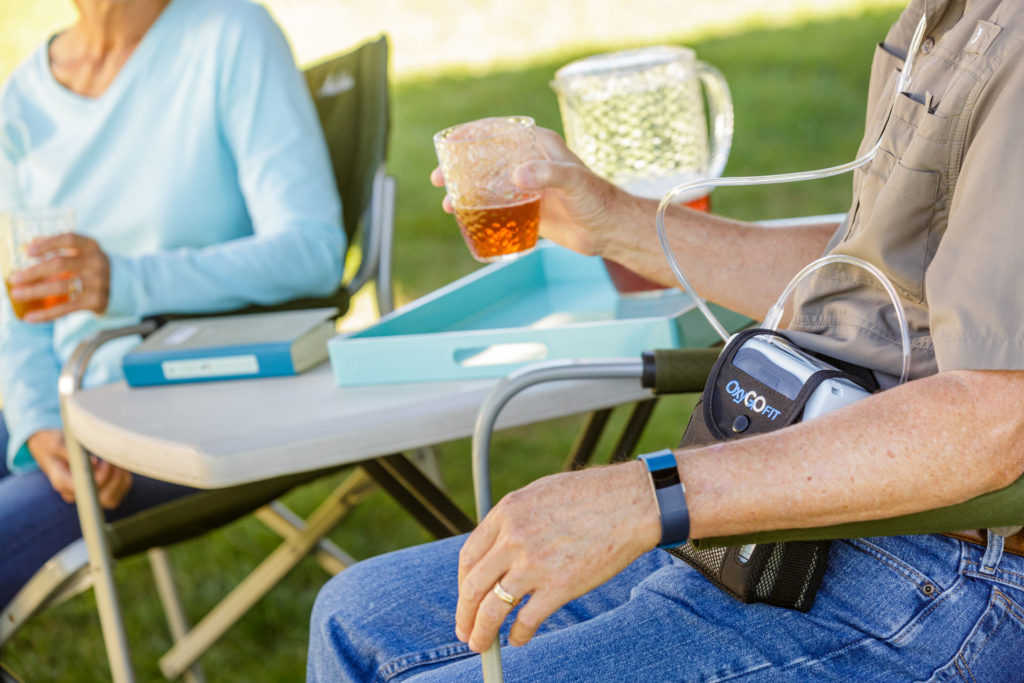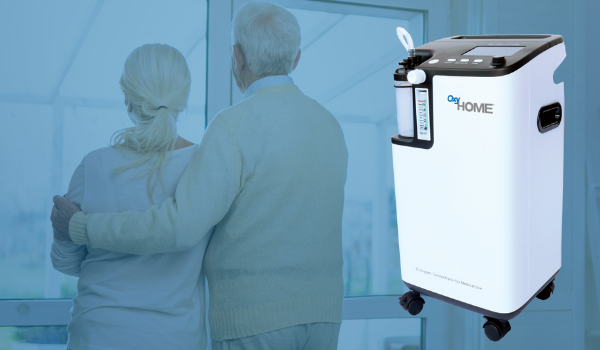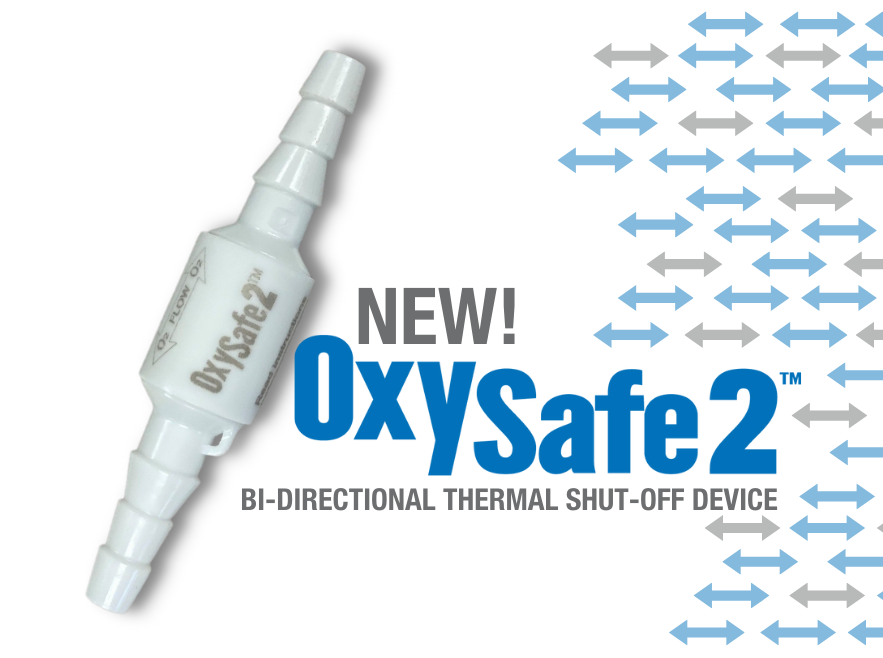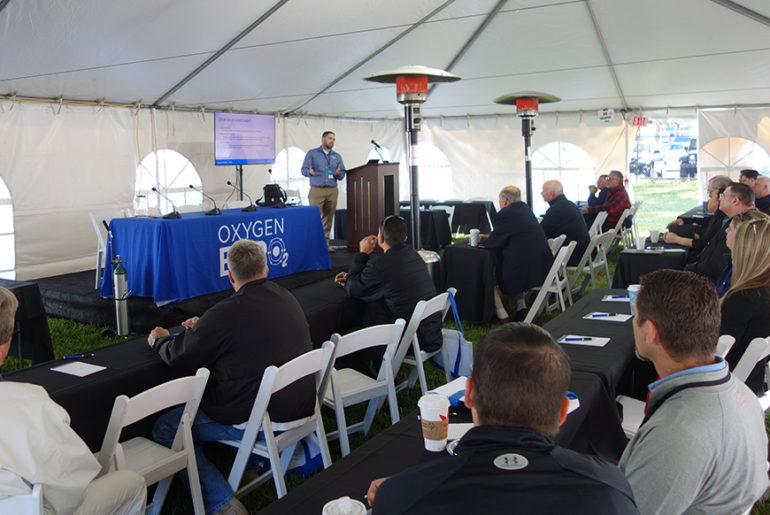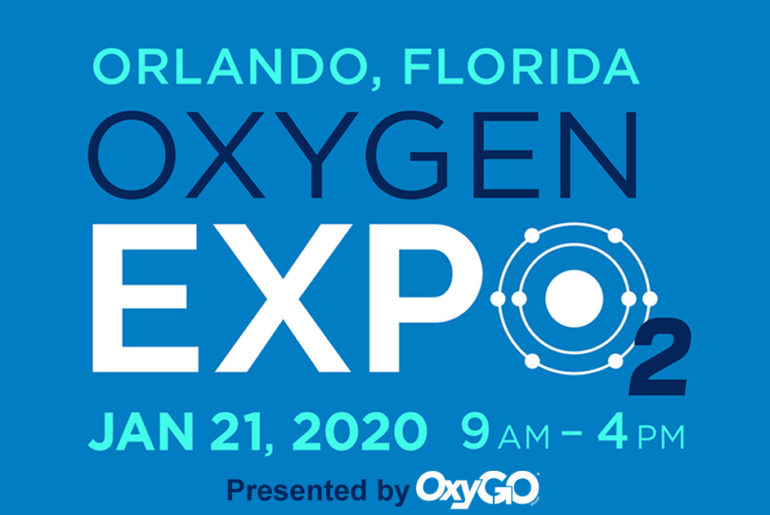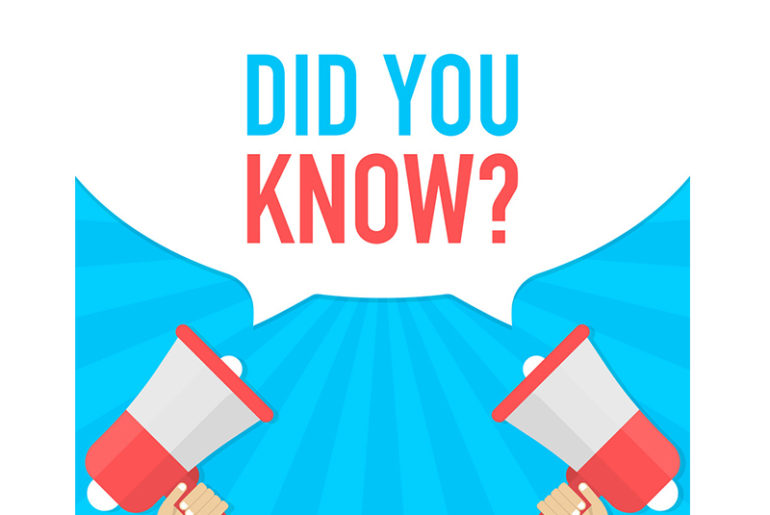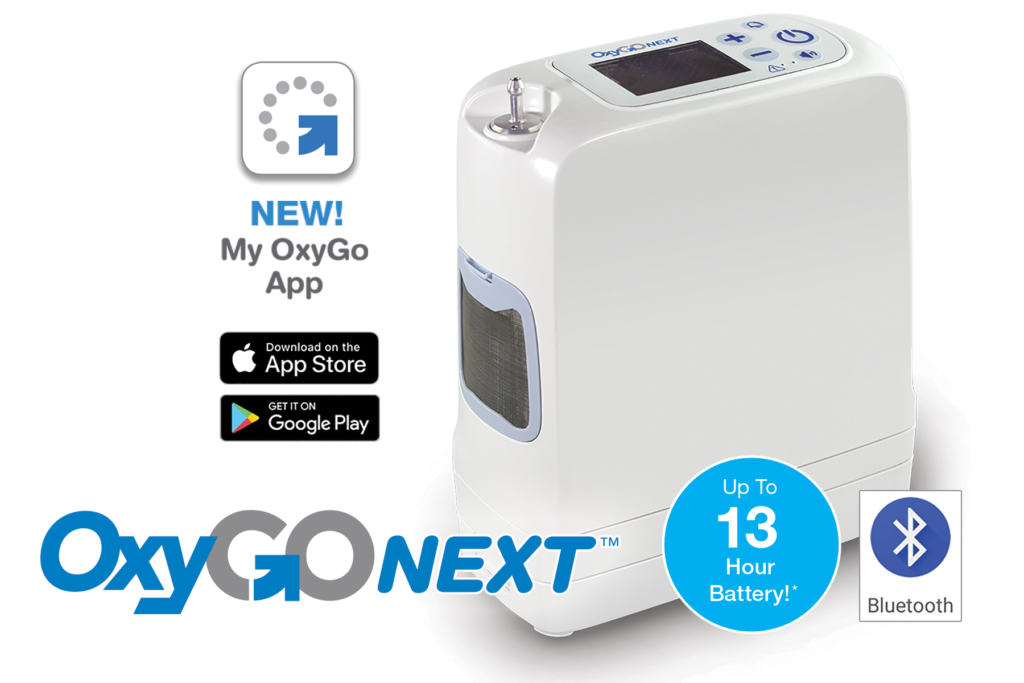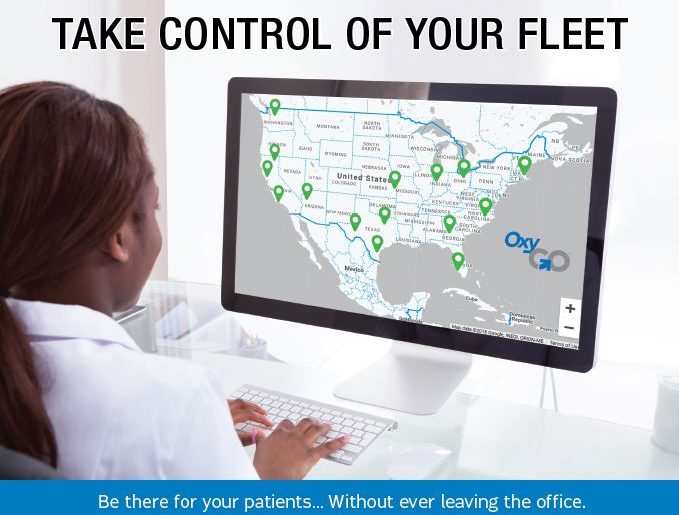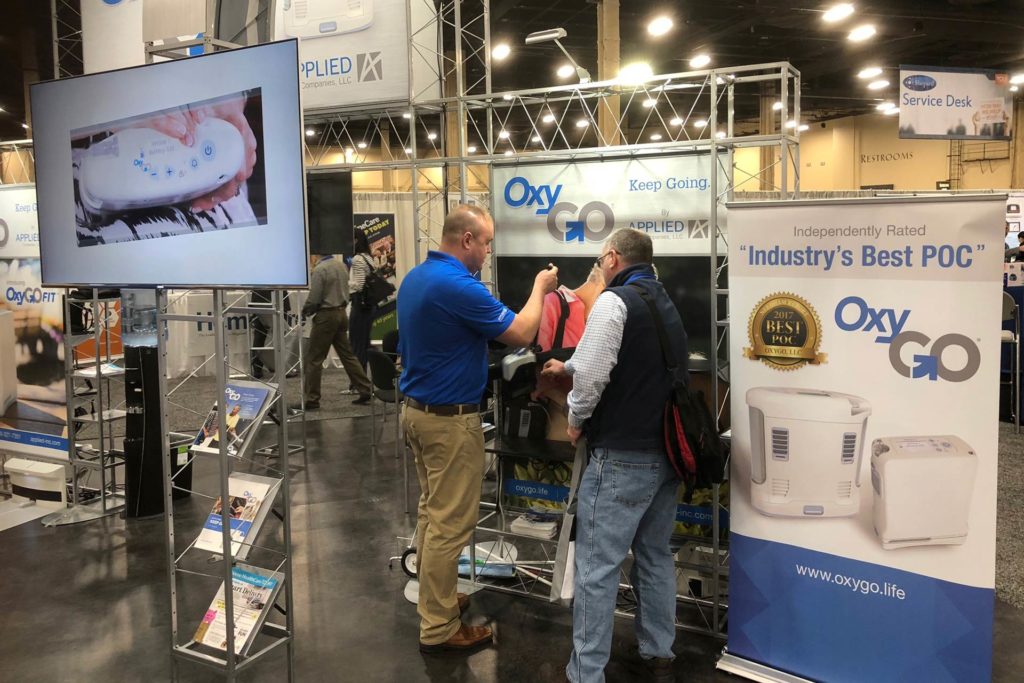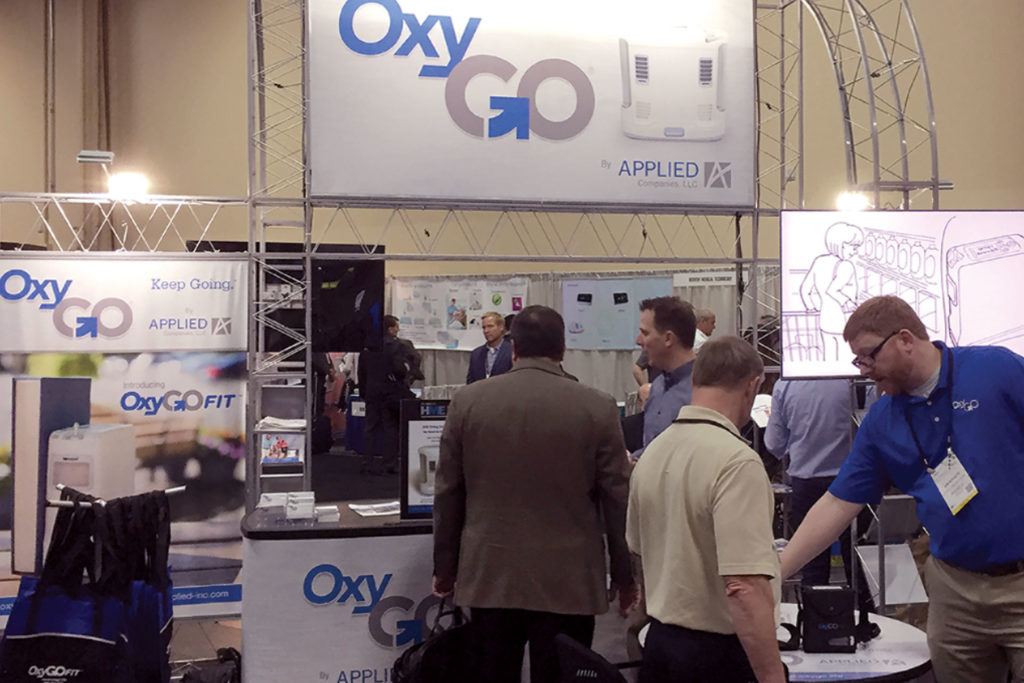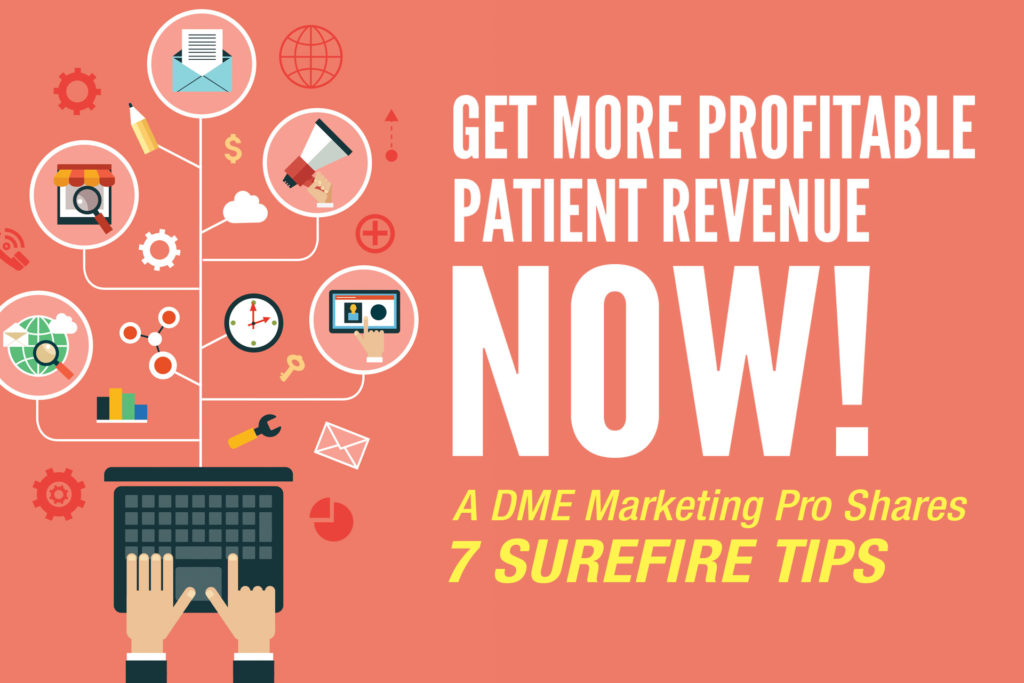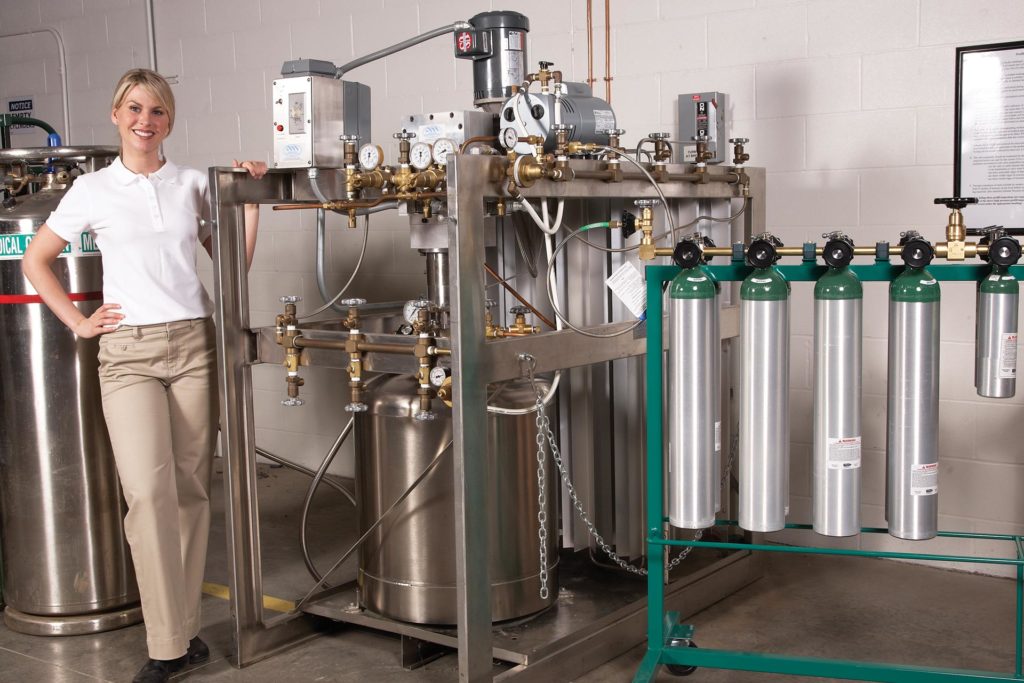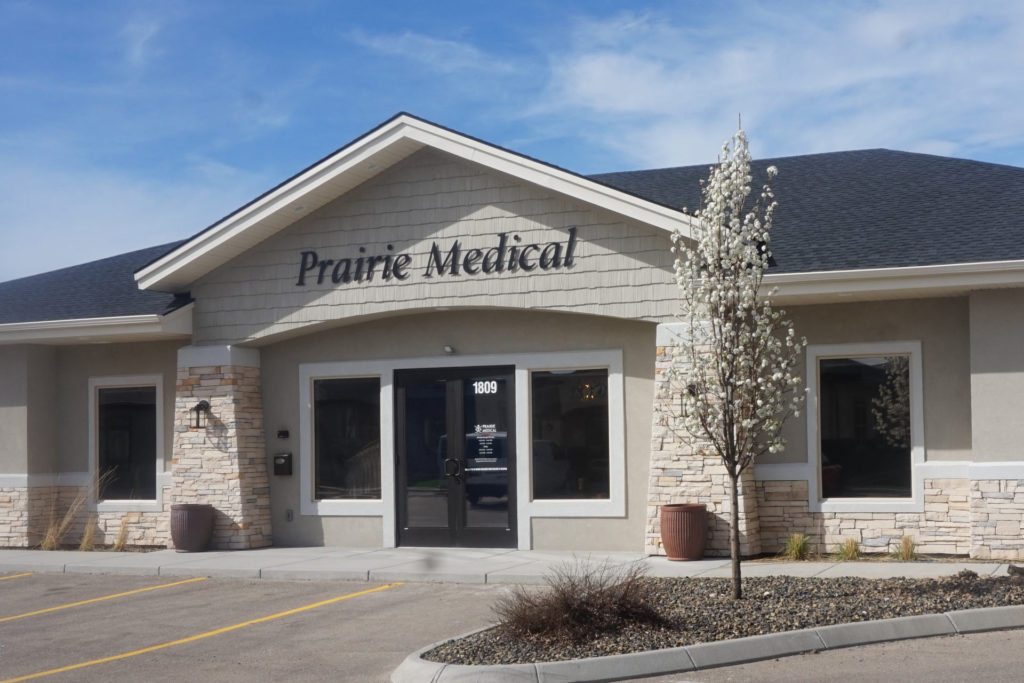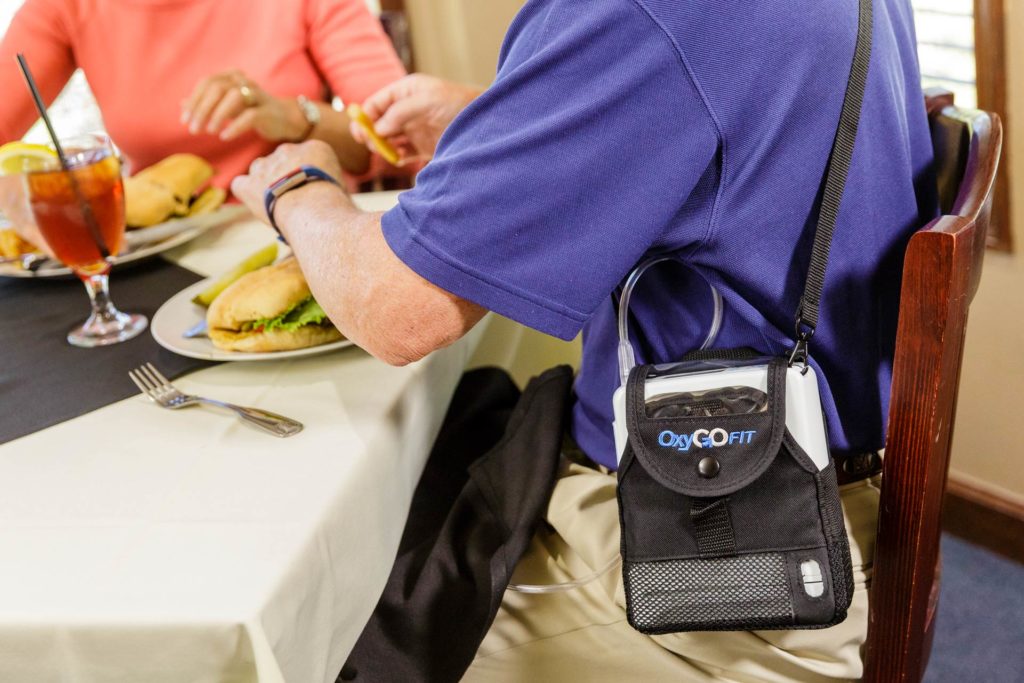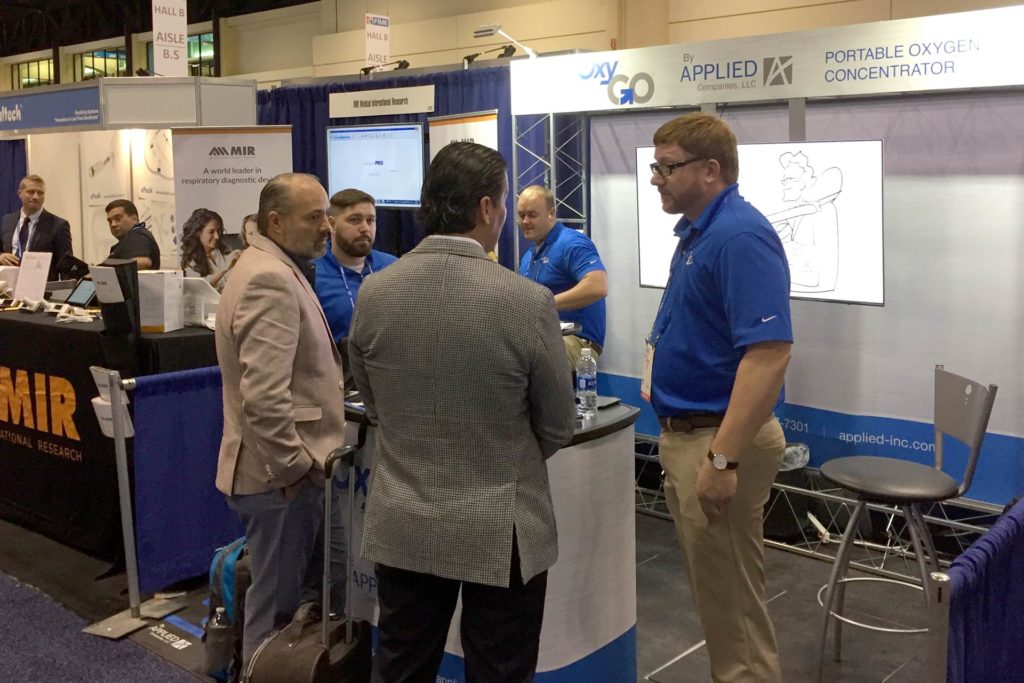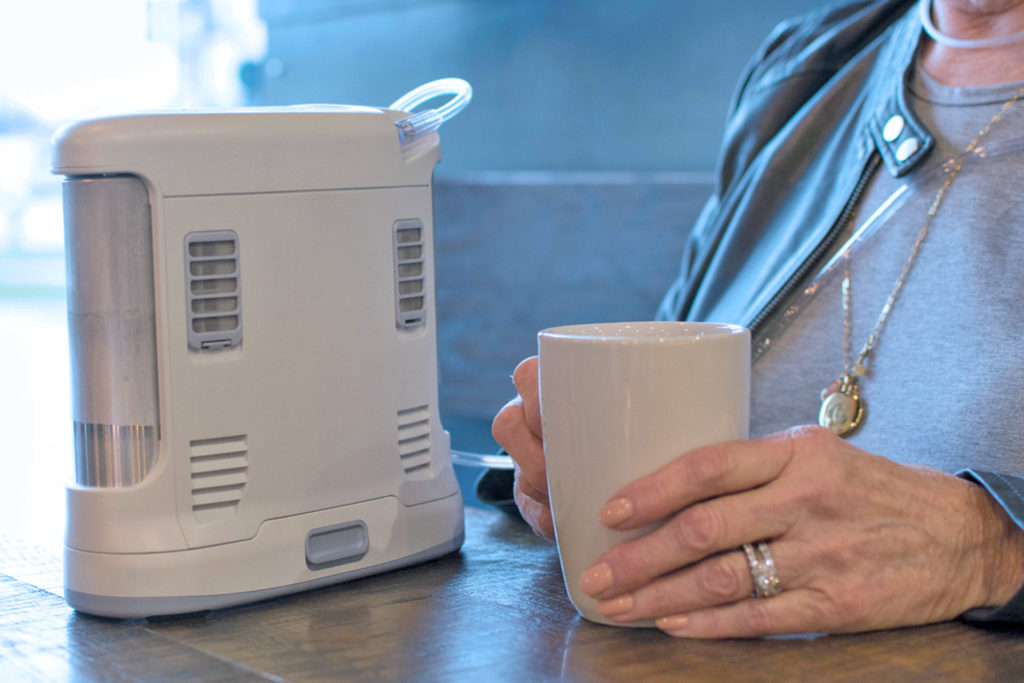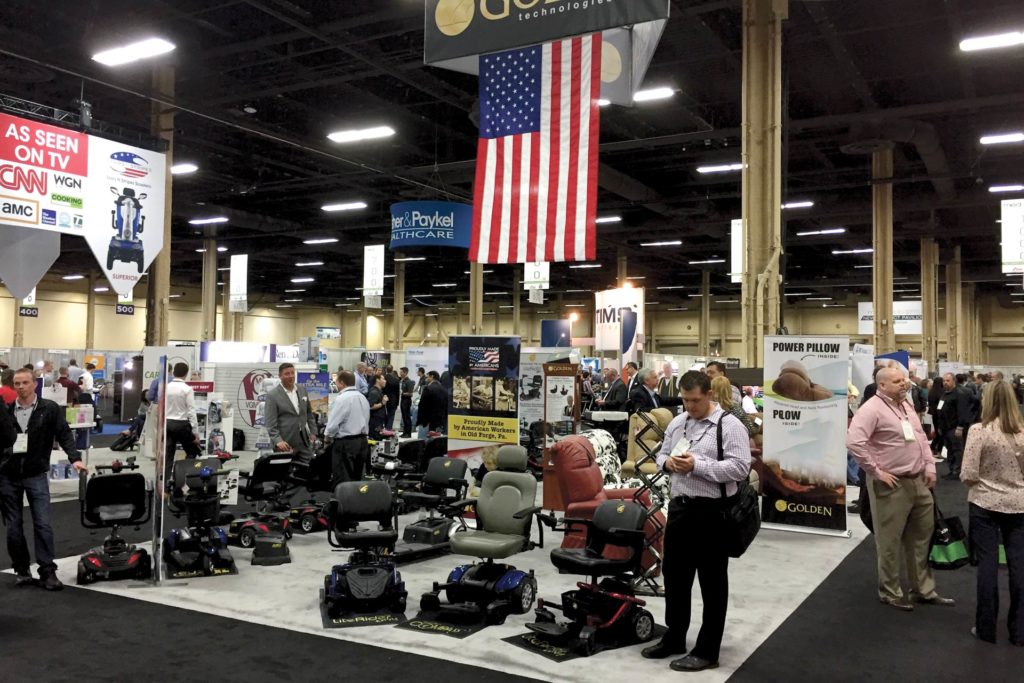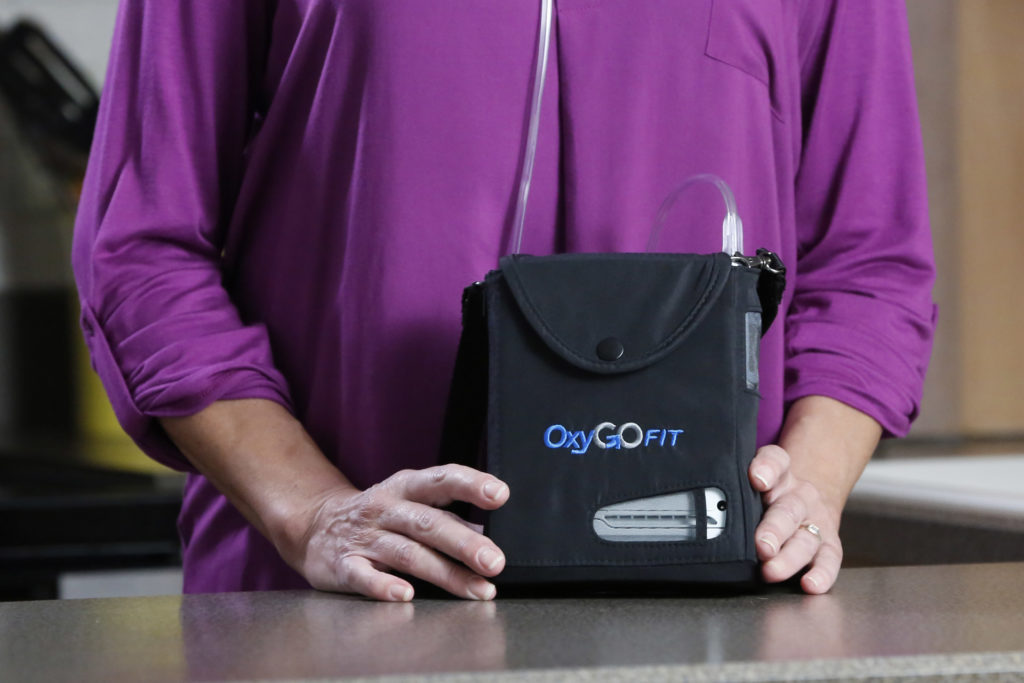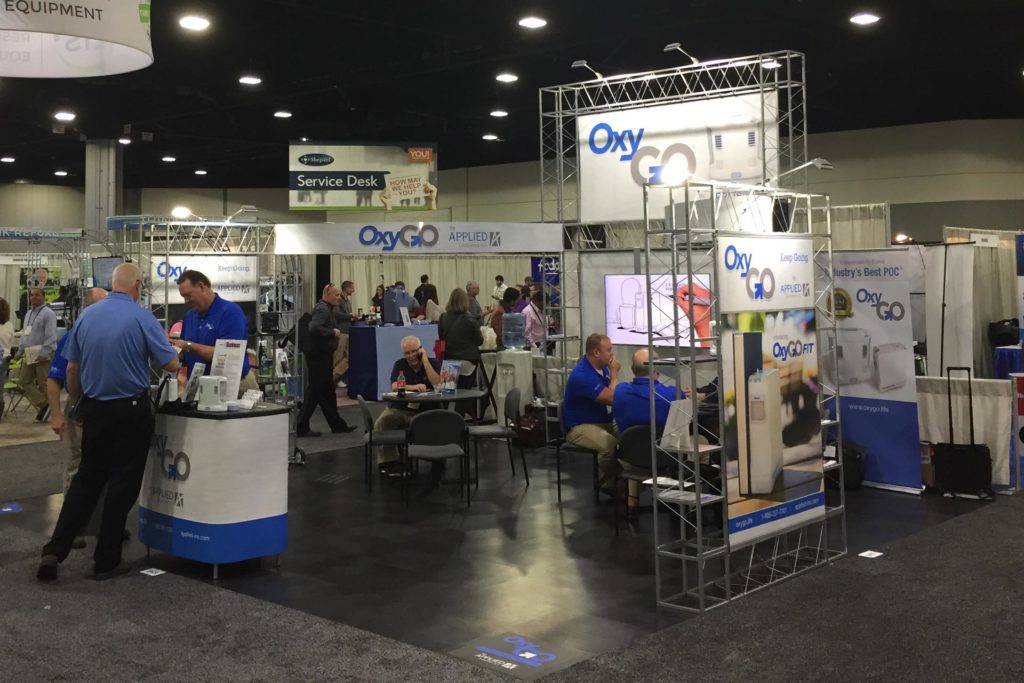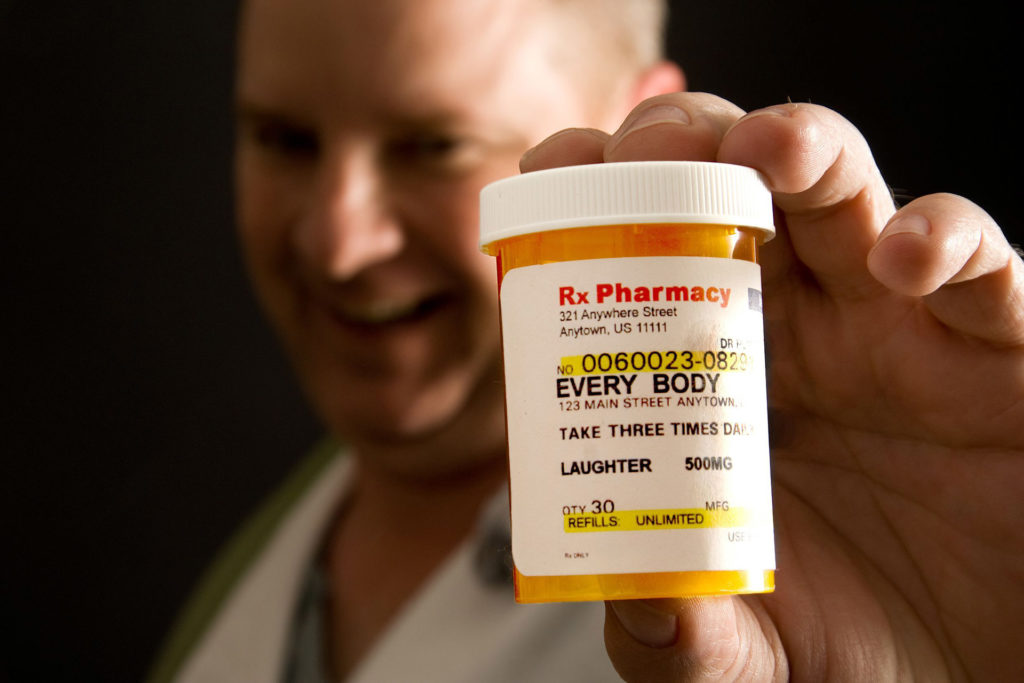Category: The Oxygo Difference
Portable Oxygen Concentrators: What are they and how do they work?
Portable oxygen concentrators, or POCs, are lightweight medical devices that dispense oxygen while being highly portable. They allow those prescribed medical oxygen to carry their own oxygen supply with them wherever they go, eliminating dependence on bulky and heavy oxygen tanks. The lightest POC on the market, the OxyGo FIT, weighs just 2.8 pounds. In the past decade POCs have made an enormous contribution to the effectiveness of oxygen delivery therapy. They are easier for patients to use and less expensive for providers to service. Before their development, patients needing oxygen at home depended on heavy oxygen tanks to dispense their oxygen. They were tethered to these tanks and could not leave home easily. Their only option to get out of the house was to attach themselves to smaller oxygen tanks on wheels and drag those tanks around with them. Such tanks can still be used today but they are obtrusive, call attention to the person using them and have restrictions as to where they can be taken. POCs have become an oxygen patient’s gateway to freedom. They do this by making their own oxygen from the air around them. POCs often enable oxygen patients to enjoy activities and exercises that were difficult or not possible while using oxygen tanks. This gives these patients a welcome sense of freedom that enhances their quality of life. Studies show that POCs help patients live longer lives by promoting mobility and exercise
Why the #1-Rated POC is NOT Selling Direct
OxyGo® is known for its amazing customer service, sales and marketing support. And its brand, Applied Home Healthcare Equipment, has long been trusted by providers as a resource for oxygen filling, technical and regulatory support. Recently, and for the second year in a row, OxyGo POCs have been independently rated as the industry’s best — ahead of all competitors. Independent analysts surveyed and researched the top brands in the industry, and OxyGo is rated #1 over and over again. Check out the independent study: www.oxygo.life/best-poc.pdf We wanted to know their secret — With a great brand and unit, why won’t OxyGo follow suit with all the other big manufacturers selling direct? “I think patients get the best care—the care they need—from providers. That’s why we connect patients that contact us with providers to get their OxyGo. We don’t sell direct to patients, for cash or otherwise.” Victoria Marquard-Schultz, Managing Director of OxyGo, is clearly passionate about providers and what they do for patients. “In fact, we are creating more and more programs to connect patients to providers—and help providers supply patients with an OxyGo. We’ve created the OxyGo Concierge service, which is helping a lot of patients live better lives with OxyGo, but with a local provider.” The OxyGo Concierge service is OxyGo’s way of capturing pat
Trust Your Gut to Make the Right Choice
You may have heard of The Centipede’s Dilemma: A centipede was happy – quite! Until a toad in fun Said, “Pray, which leg moves after which?” This raised her doubts to such a pitch, She fell exhausted in the ditch Not knowing how to run. An ancient Chinese philosopher I studied in college had simple advice: “Your first or second choice is probably your best choice.” Don’t overthink. Go with your gut feeling. Don’t waste your time thinking of too many alternatives. If you are buying a car, for example, and your first color choices are red and blue, don’t waste your time looking at yellow or orange or silver. Your happiest decision, the decision that is most likely to end up being the right decision for you, is red or blue. Translated into today’s world, this means listen to your instincts. Give your first impressions strong weight, as they are most often correct. Do I hire this person? Do I buy this house? Do I buy this car? Do I go ahead with the deal? Your gut feel is based on your personal life experiences. The more you experience the more accurate your guts become. While gut feelings are not a perfect science for decision-making, it always pays to give weight to a voice that tells you with close to certainty what the right course of action is to take. We hope when it comes to recommending POCs to your patients
The OxyGo Difference
An acquaintance recently asked me how providers of home healthcare equipment might define what I like to think of as “The OxyGo Difference.” I'd love to have your help answering that question—in fact, I'll provide $100 Amazon gift card to those who submit what I think are the three best responses. Here is what I believe—and hope—our customers would say, if asked: “We have been doing business with Applied for many years and they have always been responsive and provided great customer service that exceeded our expectations. We thought we would give their OxyGo POC a chance. Turned out we loved the OxyGo POC because it is just a great product, dependable as heck and has lots of patient demand. We bought more than we had planned and it keeps on selling.” ~ Karen P “Frankly, we are one of the largest sellers of POCs in the U.S. and we can and do have the pick of any POC we want to offer to our patients. We adopted POCs early and we paid for adopting them early too, with lots of out- of- box failures, warranty issues, and customer complaints galore. However, these issues never surfaced with OxyGo. OxyGo was our third or fourth vendor and they quickly blew away all of their competition. They provided customer service and care at a level that exceeded our largest and most trusted vendors. Plus, the OxyGo just didn't fail. Its returns were at level of 0.04% instead of
Creating a Successful Referral Network
It is no secret that strong, reliable referral sources are crucial to any provider's business. An effective, high-caliber network will give any HME the extra boost to reach its bottom line, establishing a strong reputation and setting your HME apart from the others. Making sure your customers are satisfied and have positive experiences with your level of service will of course help grow your network. A happy customer will pass along your name to potential prospect, who will then be more likely to reach out to you directly. But while relying on your customers to serve as ambassadors to your business is essential, it is important not to overlook your peers right within the HME community. Providers who work within a hospital setting have challenges unique their independent counterparts. Because of this, it may be easy for a hospital-based HME provider to feel alone, or feel that their access to resources is limited. This can be especially true of smaller hospital-based HMEs with fewer than 10 providers. However, joining a hospital group network through a group purchasing organization (GPO) can provide much needed support and crucial access to networking understanding performance metrics. A hospital group network helps to facilitate relationship development and networking. Being a part of a GPO network will help you exchange best practices with other hospital-based HME providers who face the same challenges pertaining to retail, billing, technology, how to increase refer
Setting Achievable Goals for Your Business
It’s no surprise that having and achieving business goals are critical for any kind of success. Goals are necessary to help you identify who you are, what you want and how you can grow as a provider. But for many, the process of identifying your goals can seem more daunting than it needs to be. Here’s a quick guide on setting goals efficiently, so you can dedicate more time to actually achieving them. 1. REMOVE the roadblock Taking those first steps toward identifying your goals can be intimidating. The best thing to keep in mind is that there is no right way to start, nor is there a perfect time. So jump in with both feet—brainstorm a list of anything and everything that could help achieve your bottom line. 2. REFINE your vision Now go back through the list from your brainstorming session and start fleshing it out into actionable items that are broken down into steps. This means you’re making your goals SMART: specific, measureable, attainable, realistic and time-based. 3. REVISIT your commitment We all know how busy day-to-day life gets, and that’s no exception for providers. It’s important to keep your goals top of mind so that you stay focused and committed to achieving them. Keep a physical list within view at your desk, set reminders on your calendar—whatever you need to keep yourself accountable and on
Recognizing the Famous… and Not So Famous
I was intrigued by an article I read recently in Cristaux, a design & manufacturing company with a global vision that specializes in custom awards and other high-end forms of recognition. It rated the most famous awards in the world that annually bestow recognition and fame on their recipients. You may not be familiar with all of them… you may disagree with the rankings… but you probably have heard of many of them. 1: The Nobel Prize — multiple categories such as medicine, literature, chemistry, physics and many more. 2: The Booker Prize — Britain’s most prestigious literary award. 3: The Academy Awards — A billion viewers worldwide watch the Oscars handed out to actors, directors and best movies of the year. 4: The BAFTA Awards — The UK equivalent of the Emmys honors film and TV achievements. 5: The Palme d’Or — The most prestigious prize at the Cannes Film Festival. Recognition of hard work and talent counts! Awards presented within your own DME business will not be seen by millions—but they will inspire! I have seen studies that show recognition provided to workers and associates on the job is more important than monetary compensation. There are times when more than just a “thank you” is needed to match the impact of a person’s efforts. Here are four reasons to give r
Tips To Help You Grow Your Business
In 2005 I was given the responsibility of starting a new homecare company from scratch for the Cleveland Clinic. It was structured to focus only on providing respiratory products and services for the home. We were classified not as a DME but as a DMR (Durable Medical Respiratory) company. For those of you not familiar with the Cleveland Clinic, it’s a huge medical system consisting of 10 hospitals, 18 family practice centers, and over 47,000 employees. U.S. News & World Report ranked it the #2 medical system in the country. I knew it was going to be a daunting task, but I felt the experiences I had obtained in my career had well prepared me for the challenge. During that journey, I was fortunate to pick up tips along the way that helped me sustain yearly double-digit financial growth and keep our turnover rate around 0.4%. Here are five of the tips I found to be among the most beneficial over the years: 1. Make your employees your number one priority and the rest will follow. Unless you are superman (or woman), you cannot run your company by yourself. View your employees as your number one asset. Employees that are happy at the workplace generate a positive energy that is contagious. Don’t always hire based on skills. You can train the person to perform the skills necessary for the job. What you can’t teach is personality. An employee with a positive, upbe
365 Days of Marketing
Have you considered building special promotions that relate to national healthcare days and months? … WHY NOT? Opportunity knocks all year ‘round! Did you know, for example, that March 1 is International Wheelchair Day? … Or that October 8 is National Oxygen Awareness Day? … Or that November is COPD month? There are cool things you can do to promote many of the products you sell around these “official” days and months. Here are eleven inexpensive marketing ideas you might want to consider… Making hot chocolate or coffee available Using festival lighting to illuminate products Holding a “special events” sale Decorating your website with event-related elements Offering a prize drawing from a box on one of your best-selling products Renting a “talking robot” or parrot to attract attention Promoting the day, week or month with colorful posters Advertising an event or sale in a local paper or on radio/TV Displaying a cash saving sign Giving away “something” of value to every person who enters your store Thinking of your own creative promotion to fit a specific occasion Here are upcoming national healthcare days, weeks and months scheduled for 2018. Scan the list and think of a promotion that could help boost your business! MARCH National Doctor’s Month Patient Safety Awarene
In the Know with OxyGo
Say hello to Robert “Bob” Gunner, one of the most dedicated exercise fanatics in Sugarland, Texas. Bob, an OxyGo® sales rep, has lived in the Houston area since 2010 when he moved to Texas from Denver, with his wife, Rhonda, and two children, both now adults. On any given day when not on the road, Bob usually spends about 35 minutes in his home’s second floor “workout room” where he enjoys lapping the miles on his Octane Zero Runner Elliptical ZR7 running machine. “I’ve had a hip replacement and the machine reduces the impact of gravity on my ankles and legs and allows me to keep running, which I have always enjoyed doing,” said Bob. Bob founded his medical healthcare rep firm in Denver in the mid 1980s and has enjoyed working with and meeting people in the home healthcare industry throughout his career. “I’m not in the business for a quick sale. I like building long-term relationships and helping my customers grow their businesses,” said Bob. He puts about 35,000 miles a year on his car while calling on OxyGo accounts in Texas and Colorado. Bob once put 283,000 miles on a Honda Pilot. Most of Bob’s Lone Star state focus is in southern Texas, especially in the Houston, Austin and San Antonio metropolitan areas. In Colorado, Bob says just about every home healthcare provider knows him. A long time Denver Bron
Blog - The Oxygo Difference
Category: The Oxygo Difference
Portable Oxygen Concentrators: What are they and how do they work?
Portable oxygen concentrators, or POCs, are lightweight medical devices that dispense oxygen while being highly portable. They allow those prescribed medical oxygen to carry their own oxygen supply with them wherever they go, eliminating dependence on bulky and heavy oxygen tanks. The lightest POC on the market, the OxyGo FIT, weighs just 2.8 pounds. In the past decade POCs have made an enormous contribution to the effectiveness of oxygen delivery therapy. They are easier for patients to use and less expensive for providers to service. Before their development, patients needing oxygen at home depended on heavy oxygen tanks to dispense their oxygen. They were tethered to these tanks and could not leave home easily. Their only option to get out of the house was to attach themselves to smaller oxygen tanks on wheels and drag those tanks around with them. Such tanks can still be used today but they are obtrusive, call attention to the person using them and have restrictions as to where they can be taken. POCs have become an oxygen patient’s gateway to freedom. They do this by making their own oxygen from the air around them. POCs often enable oxygen patients to enjoy activities and exercises that were difficult or not possible while using oxygen tanks. This gives these patients a welcome sense of freedom that enhances their quality of life. Studies show that POCs help patients live longer lives by promoting mobility and exercise
Why the #1-Rated POC is NOT Selling Direct
OxyGo® is known for its amazing customer service, sales and marketing support. And its brand, Applied Home Healthcare Equipment, has long been trusted by providers as a resource for oxygen filling, technical and regulatory support. Recently, and for the second year in a row, OxyGo POCs have been independently rated as the industry’s best — ahead of all competitors. Independent analysts surveyed and researched the top brands in the industry, and OxyGo is rated #1 over and over again. Check out the independent study: www.oxygo.life/best-poc.pdf We wanted to know their secret — With a great brand and unit, why won’t OxyGo follow suit with all the other big manufacturers selling direct? “I think patients get the best care—the care they need—from providers. That’s why we connect patients that contact us with providers to get their OxyGo. We don’t sell direct to patients, for cash or otherwise.” Victoria Marquard-Schultz, Managing Director of OxyGo, is clearly passionate about providers and what they do for patients. “In fact, we are creating more and more programs to connect patients to providers—and help providers supply patients with an OxyGo. We’ve created the OxyGo Concierge service, which is helping a lot of patients live better lives with OxyGo, but with a local provider.” The OxyGo Concierge service is OxyGo’s way of capturing pat
Trust Your Gut to Make the Right Choice
You may have heard of The Centipede’s Dilemma: A centipede was happy – quite! Until a toad in fun Said, “Pray, which leg moves after which?” This raised her doubts to such a pitch, She fell exhausted in the ditch Not knowing how to run. An ancient Chinese philosopher I studied in college had simple advice: “Your first or second choice is probably your best choice.” Don’t overthink. Go with your gut feeling. Don’t waste your time thinking of too many alternatives. If you are buying a car, for example, and your first color choices are red and blue, don’t waste your time looking at yellow or orange or silver. Your happiest decision, the decision that is most likely to end up being the right decision for you, is red or blue. Translated into today’s world, this means listen to your instincts. Give your first impressions strong weight, as they are most often correct. Do I hire this person? Do I buy this house? Do I buy this car? Do I go ahead with the deal? Your gut feel is based on your personal life experiences. The more you experience the more accurate your guts become. While gut feelings are not a perfect science for decision-making, it always pays to give weight to a voice that tells you with close to certainty what the right course of action is to take. We hope when it comes to recommending POCs to your patients
The OxyGo Difference
An acquaintance recently asked me how providers of home healthcare equipment might define what I like to think of as “The OxyGo Difference.” I'd love to have your help answering that question—in fact, I'll provide $100 Amazon gift card to those who submit what I think are the three best responses. Here is what I believe—and hope—our customers would say, if asked: “We have been doing business with Applied for many years and they have always been responsive and provided great customer service that exceeded our expectations. We thought we would give their OxyGo POC a chance. Turned out we loved the OxyGo POC because it is just a great product, dependable as heck and has lots of patient demand. We bought more than we had planned and it keeps on selling.” ~ Karen P “Frankly, we are one of the largest sellers of POCs in the U.S. and we can and do have the pick of any POC we want to offer to our patients. We adopted POCs early and we paid for adopting them early too, with lots of out- of- box failures, warranty issues, and customer complaints galore. However, these issues never surfaced with OxyGo. OxyGo was our third or fourth vendor and they quickly blew away all of their competition. They provided customer service and care at a level that exceeded our largest and most trusted vendors. Plus, the OxyGo just didn't fail. Its returns were at level of 0.04% instead of
Creating a Successful Referral Network
It is no secret that strong, reliable referral sources are crucial to any provider's business. An effective, high-caliber network will give any HME the extra boost to reach its bottom line, establishing a strong reputation and setting your HME apart from the others. Making sure your customers are satisfied and have positive experiences with your level of service will of course help grow your network. A happy customer will pass along your name to potential prospect, who will then be more likely to reach out to you directly. But while relying on your customers to serve as ambassadors to your business is essential, it is important not to overlook your peers right within the HME community. Providers who work within a hospital setting have challenges unique their independent counterparts. Because of this, it may be easy for a hospital-based HME provider to feel alone, or feel that their access to resources is limited. This can be especially true of smaller hospital-based HMEs with fewer than 10 providers. However, joining a hospital group network through a group purchasing organization (GPO) can provide much needed support and crucial access to networking understanding performance metrics. A hospital group network helps to facilitate relationship development and networking. Being a part of a GPO network will help you exchange best practices with other hospital-based HME providers who face the same challenges pertaining to retail, billing, technology, how to increase refer
Setting Achievable Goals for Your Business
It’s no surprise that having and achieving business goals are critical for any kind of success. Goals are necessary to help you identify who you are, what you want and how you can grow as a provider. But for many, the process of identifying your goals can seem more daunting than it needs to be. Here’s a quick guide on setting goals efficiently, so you can dedicate more time to actually achieving them. 1. REMOVE the roadblock Taking those first steps toward identifying your goals can be intimidating. The best thing to keep in mind is that there is no right way to start, nor is there a perfect time. So jump in with both feet—brainstorm a list of anything and everything that could help achieve your bottom line. 2. REFINE your vision Now go back through the list from your brainstorming session and start fleshing it out into actionable items that are broken down into steps. This means you’re making your goals SMART: specific, measureable, attainable, realistic and time-based. 3. REVISIT your commitment We all know how busy day-to-day life gets, and that’s no exception for providers. It’s important to keep your goals top of mind so that you stay focused and committed to achieving them. Keep a physical list within view at your desk, set reminders on your calendar—whatever you need to keep yourself accountable and on
Recognizing the Famous… and Not So Famous
I was intrigued by an article I read recently in Cristaux, a design & manufacturing company with a global vision that specializes in custom awards and other high-end forms of recognition. It rated the most famous awards in the world that annually bestow recognition and fame on their recipients. You may not be familiar with all of them… you may disagree with the rankings… but you probably have heard of many of them. 1: The Nobel Prize — multiple categories such as medicine, literature, chemistry, physics and many more. 2: The Booker Prize — Britain’s most prestigious literary award. 3: The Academy Awards — A billion viewers worldwide watch the Oscars handed out to actors, directors and best movies of the year. 4: The BAFTA Awards — The UK equivalent of the Emmys honors film and TV achievements. 5: The Palme d’Or — The most prestigious prize at the Cannes Film Festival. Recognition of hard work and talent counts! Awards presented within your own DME business will not be seen by millions—but they will inspire! I have seen studies that show recognition provided to workers and associates on the job is more important than monetary compensation. There are times when more than just a “thank you” is needed to match the impact of a person’s efforts. Here are four reasons to give r
Tips To Help You Grow Your Business
In 2005 I was given the responsibility of starting a new homecare company from scratch for the Cleveland Clinic. It was structured to focus only on providing respiratory products and services for the home. We were classified not as a DME but as a DMR (Durable Medical Respiratory) company. For those of you not familiar with the Cleveland Clinic, it’s a huge medical system consisting of 10 hospitals, 18 family practice centers, and over 47,000 employees. U.S. News & World Report ranked it the #2 medical system in the country. I knew it was going to be a daunting task, but I felt the experiences I had obtained in my career had well prepared me for the challenge. During that journey, I was fortunate to pick up tips along the way that helped me sustain yearly double-digit financial growth and keep our turnover rate around 0.4%. Here are five of the tips I found to be among the most beneficial over the years: 1. Make your employees your number one priority and the rest will follow. Unless you are superman (or woman), you cannot run your company by yourself. View your employees as your number one asset. Employees that are happy at the workplace generate a positive energy that is contagious. Don’t always hire based on skills. You can train the person to perform the skills necessary for the job. What you can’t teach is personality. An employee with a positive, upbe
365 Days of Marketing
Have you considered building special promotions that relate to national healthcare days and months? … WHY NOT? Opportunity knocks all year ‘round! Did you know, for example, that March 1 is International Wheelchair Day? … Or that October 8 is National Oxygen Awareness Day? … Or that November is COPD month? There are cool things you can do to promote many of the products you sell around these “official” days and months. Here are eleven inexpensive marketing ideas you might want to consider… Making hot chocolate or coffee available Using festival lighting to illuminate products Holding a “special events” sale Decorating your website with event-related elements Offering a prize drawing from a box on one of your best-selling products Renting a “talking robot” or parrot to attract attention Promoting the day, week or month with colorful posters Advertising an event or sale in a local paper or on radio/TV Displaying a cash saving sign Giving away “something” of value to every person who enters your store Thinking of your own creative promotion to fit a specific occasion Here are upcoming national healthcare days, weeks and months scheduled for 2018. Scan the list and think of a promotion that could help boost your business! MARCH National Doctor’s Month Patient Safety Awarene
In the Know with OxyGo
Say hello to Robert “Bob” Gunner, one of the most dedicated exercise fanatics in Sugarland, Texas. Bob, an OxyGo® sales rep, has lived in the Houston area since 2010 when he moved to Texas from Denver, with his wife, Rhonda, and two children, both now adults. On any given day when not on the road, Bob usually spends about 35 minutes in his home’s second floor “workout room” where he enjoys lapping the miles on his Octane Zero Runner Elliptical ZR7 running machine. “I’ve had a hip replacement and the machine reduces the impact of gravity on my ankles and legs and allows me to keep running, which I have always enjoyed doing,” said Bob. Bob founded his medical healthcare rep firm in Denver in the mid 1980s and has enjoyed working with and meeting people in the home healthcare industry throughout his career. “I’m not in the business for a quick sale. I like building long-term relationships and helping my customers grow their businesses,” said Bob. He puts about 35,000 miles a year on his car while calling on OxyGo accounts in Texas and Colorado. Bob once put 283,000 miles on a Honda Pilot. Most of Bob’s Lone Star state focus is in southern Texas, especially in the Houston, Austin and San Antonio metropolitan areas. In Colorado, Bob says just about every home healthcare provider knows him. A long time Denver Bron









